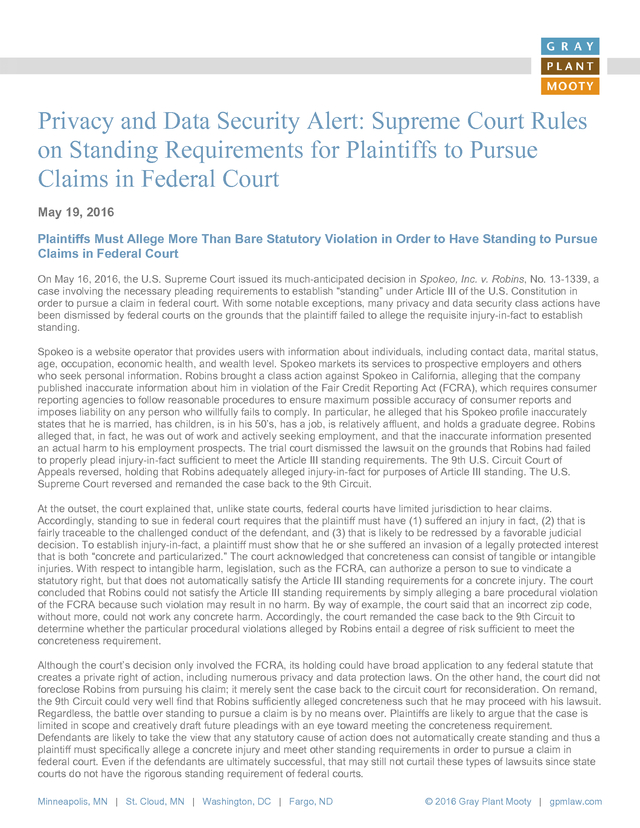Privacy and Data Security Alert: Supreme Court Rules on Standing Requirements for Plaintiffs to Pursue Claims in Federal Court - May 19, 2016
Gray Plant Mooty
Description
Privacy and Data Security Alert: Supreme Court Rules
on Standing Requirements for Plaintiffs to Pursue
Claims in Federal Court
May 19, 2016
Plaintiffs Must Allege More Than Bare Statutory Violation in Order to Have Standing to Pursue
Claims in Federal Court
On May 16, 2016, the U.S. Supreme Court issued its much-anticipated decision in Spokeo, Inc. v. Robins, No.
13-1339, a case involving the necessary pleading requirements to establish “standing” under Article III of the U.S. Constitution in order to pursue a claim in federal court. With some notable exceptions, many privacy and data security class actions have been dismissed by federal courts on the grounds that the plaintiff failed to allege the requisite injury-in-fact to establish standing. Spokeo is a website operator that provides users with information about individuals, including contact data, marital status, age, occupation, economic health, and wealth level.
Spokeo markets its services to prospective employers and others who seek personal information. Robins brought a class action against Spokeo in California, alleging that the company published inaccurate information about him in violation of the Fair Credit Reporting Act (FCRA), which requires consumer reporting agencies to follow reasonable procedures to ensure maximum possible accuracy of consumer reports and imposes liability on any person who willfully fails to comply. In particular, he alleged that his Spokeo profile inaccurately states that he is married, has children, is in his 50’s, has a job, is relatively affluent, and holds a graduate degree.
Robins alleged that, in fact, he was out of work and actively seeking employment, and that the inaccurate information presented an actual harm to his employment prospects. The trial court dismissed the lawsuit on the grounds that Robins had failed to properly plead injury-in-fact sufficient to meet the Article III standing requirements. The 9th U.S.
Circuit Court of Appeals reversed, holding that Robins adequately alleged injury-in-fact for purposes of Article III standing. The U.S. Supreme Court reversed and remanded the case back to the 9th Circuit. At the outset, the court explained that, unlike state courts, federal courts have limited jurisdiction to hear claims. Accordingly, standing to sue in federal court requires that the plaintiff must have (1) suffered an injury in fact, (2) that is fairly traceable to the challenged conduct of the defendant, and (3) that is likely to be redressed by a favorable judicial decision. To establish injury-in-fact, a plaintiff must show that he or she suffered an invasion of a legally protected interest that is both “concrete and particularized.” The court acknowledged that concreteness can consist of tangible or intangible injuries.
With respect to intangible harm, legislation, such as the FCRA, can authorize a person to sue to vindicate a statutory right, but that does not automatically satisfy the Article III standing requirements for a concrete injury. The court concluded that Robins could not satisfy the Article III standing requirements by simply alleging a bare procedural violation of the FCRA because such violation may result in no harm. By way of example, the court said that an incorrect zip code, without more, could not work any concrete harm.
Accordingly, the court remanded the case back to the 9th Circuit to determine whether the particular procedural violations alleged by Robins entail a degree of risk sufficient to meet the concreteness requirement. Although the court’s decision only involved the FCRA, its holding could have broad application to any federal statute that creates a private right of action, including numerous privacy and data protection laws. On the other hand, the court did not foreclose Robins from pursuing his claim; it merely sent the case back to the circuit court for reconsideration. On remand, the 9th Circuit could very well find that Robins sufficiently alleged concreteness such that he may proceed with his lawsuit. Regardless, the battle over standing to pursue a claim is by no means over.
Plaintiffs are likely to argue that the case is limited in scope and creatively draft future pleadings with an eye toward meeting the concreteness requirement. Defendants are likely to take the view that any statutory cause of action does not automatically create standing and thus a plaintiff must specifically allege a concrete injury and meet other standing requirements in order to pursue a claim in federal court. Even if the defendants are ultimately successful, that may still not curtail these types of lawsuits since state courts do not have the rigorous standing requirement of federal courts. Minneapolis, MN | St. Cloud, MN | Washington, DC | Fargo, ND © 2016 Gray Plant Mooty | gpmlaw.com .
Minneapolis, MN | St. Cloud, MN | Washington, DC | Fargo, ND © 2016 Gray Plant Mooty | gpmlaw.com .
13-1339, a case involving the necessary pleading requirements to establish “standing” under Article III of the U.S. Constitution in order to pursue a claim in federal court. With some notable exceptions, many privacy and data security class actions have been dismissed by federal courts on the grounds that the plaintiff failed to allege the requisite injury-in-fact to establish standing. Spokeo is a website operator that provides users with information about individuals, including contact data, marital status, age, occupation, economic health, and wealth level.
Spokeo markets its services to prospective employers and others who seek personal information. Robins brought a class action against Spokeo in California, alleging that the company published inaccurate information about him in violation of the Fair Credit Reporting Act (FCRA), which requires consumer reporting agencies to follow reasonable procedures to ensure maximum possible accuracy of consumer reports and imposes liability on any person who willfully fails to comply. In particular, he alleged that his Spokeo profile inaccurately states that he is married, has children, is in his 50’s, has a job, is relatively affluent, and holds a graduate degree.
Robins alleged that, in fact, he was out of work and actively seeking employment, and that the inaccurate information presented an actual harm to his employment prospects. The trial court dismissed the lawsuit on the grounds that Robins had failed to properly plead injury-in-fact sufficient to meet the Article III standing requirements. The 9th U.S.
Circuit Court of Appeals reversed, holding that Robins adequately alleged injury-in-fact for purposes of Article III standing. The U.S. Supreme Court reversed and remanded the case back to the 9th Circuit. At the outset, the court explained that, unlike state courts, federal courts have limited jurisdiction to hear claims. Accordingly, standing to sue in federal court requires that the plaintiff must have (1) suffered an injury in fact, (2) that is fairly traceable to the challenged conduct of the defendant, and (3) that is likely to be redressed by a favorable judicial decision. To establish injury-in-fact, a plaintiff must show that he or she suffered an invasion of a legally protected interest that is both “concrete and particularized.” The court acknowledged that concreteness can consist of tangible or intangible injuries.
With respect to intangible harm, legislation, such as the FCRA, can authorize a person to sue to vindicate a statutory right, but that does not automatically satisfy the Article III standing requirements for a concrete injury. The court concluded that Robins could not satisfy the Article III standing requirements by simply alleging a bare procedural violation of the FCRA because such violation may result in no harm. By way of example, the court said that an incorrect zip code, without more, could not work any concrete harm.
Accordingly, the court remanded the case back to the 9th Circuit to determine whether the particular procedural violations alleged by Robins entail a degree of risk sufficient to meet the concreteness requirement. Although the court’s decision only involved the FCRA, its holding could have broad application to any federal statute that creates a private right of action, including numerous privacy and data protection laws. On the other hand, the court did not foreclose Robins from pursuing his claim; it merely sent the case back to the circuit court for reconsideration. On remand, the 9th Circuit could very well find that Robins sufficiently alleged concreteness such that he may proceed with his lawsuit. Regardless, the battle over standing to pursue a claim is by no means over.
Plaintiffs are likely to argue that the case is limited in scope and creatively draft future pleadings with an eye toward meeting the concreteness requirement. Defendants are likely to take the view that any statutory cause of action does not automatically create standing and thus a plaintiff must specifically allege a concrete injury and meet other standing requirements in order to pursue a claim in federal court. Even if the defendants are ultimately successful, that may still not curtail these types of lawsuits since state courts do not have the rigorous standing requirement of federal courts. Minneapolis, MN | St. Cloud, MN | Washington, DC | Fargo, ND © 2016 Gray Plant Mooty | gpmlaw.com .
Minneapolis, MN | St. Cloud, MN | Washington, DC | Fargo, ND © 2016 Gray Plant Mooty | gpmlaw.com .













